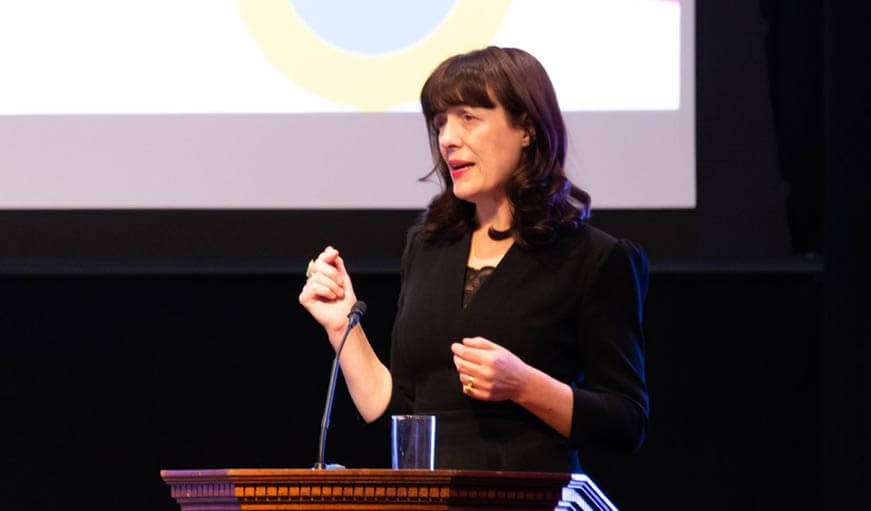A partnership approach – which included citizen engagement, frontline enablement, political buy in and buy in by the wider determinants stakeholders – was critical to the implementation of Sláintecare, Laura Magahy, Executive Director, Sláintecare, told the Conference.

She was speaking on the Sláintecare Implementation Strategy.
Ms. Magahy said she was just ten weeks into her new role. “The vision has been set and my role is to implement, enable and drive it along. I will be translating the strategy into a plan.
“The idea is that we would have a structured systematic view of health and social care where everyone plays their part.
“The Sláintecare objectives are to:
- Promote the health of our population to prevent illness
- Bring the majority of care into the community
- Create an integrated system of care, with healthcare professionals working closely together
- Create a system where care is provided on the basis of need, not ability to pay
- Move our system from long waiting times to a timely service
- Drive accountability and performance in the health service
- Deliver a health service that has the capacity and ability to plan for, and manage, changing needs.”
Ms. Magahy said the remit of her programme office was to establish the programme of reform, to develop a strategic and programmatic approach to implementation, to ensure all parts of the system were following the strategy, to work collaboratively with all stakeholders, to support the work of colleagues and reform efforts and to report on progress.
We want citizens and staff engagement about the kind of service they would like plus their views on entitlement and eligibility.
“I am not about duplicating effort,” she stressed.
She said the transformation planned under Sláintecare would depend on the right mindset and effective performance management.
The right mindset involved guiding coalition, shared vision, ambition, clear priorities, ministerial consistency, urgency, capacity to learn rapid, collaboration across government and collaboration between the Department of Health, HSE and stakeholders.
Effective performance management included targets, good real time data, best practice transfer, transparency, management against trajectory. capacity to intervene where necessary and methods of recognising success.
Ms. Magahy said she was proposing four workstreams as part of the implementation plan. These were (1) Service Design & Supporting Infrastructure, (2) Co-Ordinated Governance and Value for Money, (3) Teams of the Future and (4) Sharing Progress.
The Service Design & Supporting Programme included a national health information programme, population stratification by RICO (plus budget allocation) service design (right care, right place, right time) capacity Plan implementation programme and an eHealth programme.
The Co-Ordinated Governance and Value for workstream included geoalignment and RICO’s structure and governance, a delivery mechanism programme which would deal with commissioning, a Value for Money programme, an entitlement/eligibility programme and a corporate and clinical governance programme.
The Teams of the Future workstream would include a workforce planning programme, a training pipeline and news ways of training programme, a culture change (new ways of working) programme, an innovation/capacity building programme and future intelligence/influencers programme (artificial intelligence, robotics etc.)
The Sharing Progress workstream would include a citizen and staff engagement and empowerment programme an action plan 2019, an evaluation framework and reporting progress programme, an integration fund and SC budget management and a communications programme and recognising success.
She said the Sláintecare Public and Staff Engagement & Empowerment Programme would be rolled out in 2019
They were also proposing a national health information programme. “We want to ensure equity in how all assets are distributed to population. We have to think very long and carefully as to where beds are going. eHealth is a supporter of the services.”
Ms. Magahy said it would take two years to realign CHOs and Hospital Groups in an orderly fashion.
The independent de Buitléir,report on the removal of private care from acute public hospital beds would be launched at the end of year and they would need to study its recommendations.
They also needed to see how they could get best Value for Money and it had not been decided yet if we would have entitlement or eligibility.
“We want to see people taking innovative approaches at local level rewarded. We want citizens and staff engagement about the kind of service they would like plus their views on entitlement and eligibility.
“So much good work done already not enough celebrating all the good stories in the health service.”

